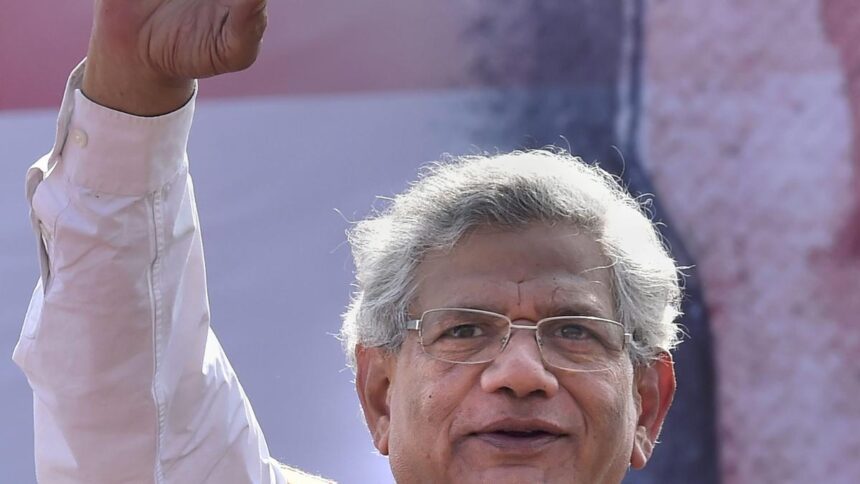[ad_1]

CPI(M) general secretary Sitaram Yechury attends a Left Front rally in Kolkata.
| Photo Credit: PTI
Though in political circles Sitaram Yechury was known as a flexible politician who can stitch impossible alliances for a common cause, within the CPI(M), he was always seen as someone who adhered to the Marxist-Leninist principles of the organisation and its politics. Well-versed in political economy as a student of economics, he chose issues based on economy, livelihood and social realities to make sure that his and his party’s voices were heard in the public sphere even when the electoral performance of the party was abysmal.
Starting his political life in the Students Federation of India, the students wing of the CPI(M), he became the national president of the organisation and was later invited to the Central Committee of the party in 1984 and was made a member of it in the 12th Party Congress in Kolkata in 1985.

An anti-imperialist to the core, Mr. Yechury had political beliefs influenced by Marxist doyens such as P Sundaraiah, M. Basavapunnaiah and E.M.S. Namboodiripad, who were also leaders of anti-colonial and anti-imperialist movements in the country. Mr. Yechury always scoffed at any external influences in national politics, which he termed as NGO-isation of politics. As an MP, he argued that corporate houses and NGOs must be brought within the ambit of the Lokpal. He believed that much of the NGO-sponsored anti-globalisation movements “can be compared to the safety valve in the pressure cooker”. “The CPI(M) has consistently been against imperialist backed foreign-funded NGOs and the associated motives of such NGOs in advancing imperialist agendas on the one hand and in seeking to disrupt the growing democratic progressive mass movements on the other. This struggle against the NGOisation of the mass protest movements is a continuous struggle that the CPI(M) is engaged in,” he said in the World Social Forum in 2004.
Similarly, he saw imperialist links in identity politics too. He was also an ardent critic of identity-based political groupings. “While appealing only to the caste consciousness and ignoring, if not evading, the basic issue of the struggle against the existing agrarian order, these leaders once again are appealing for a change in the superstructure without affecting the base. In doing so, they treat this growing consciousness amongst the Dalits and the backward caste as separate compartments, as vote banks, for their political fortunes rather than addressing themselves for a genuine solution of the problem,” he said.
He believed that people wanted a positive programme, an alternative programme from the Opposition parties and a mere opposition to the government without a credible alternative agenda would not evoke confidence among people. He invited all democratic forces to express their views about a Left and democratic programme in the political resolution of the CPI(M) two years ago.. He said marginalised sections, Dalits, Adivasis, people with disabilities, LGBTQIA+ and all democratic groups and forces would have their demands and an alternative programme would address their issues and demands and provide a policy direction to the country.

He was one of the key architects of the document, “On Certain Ideological Issues”, that helped the CPI(M) to take a stronger position in 1992, even when a number of Communist parties around the world collapsed along with the USSR. The document self-critically examined the CPI(M)’s positions on international developments. The document said the inevitability of capitalism’s collapse is not an automatic process. “Capitalism has to be overthrown. An erroneous understanding only blunts the need to constantly sharpen and strengthen the revolutionary ideological struggle of the working class and its decisive intervention under the leadership of a party wedded to Marxism-Leninism — the subjective factor without which no revolutionary transformation is possible,” it said. It was Mr. Yechury, who presented the document before the 14th Congress of the CPI(M) in 1992 held in Chennai. He was elected to the Polit Bureau of the party in that Congress.
Later in 2014, he suggested amendments to the political tactical line of the CPI(M), just ahead of the 21st Party Congress in Vishakhapatnam. The meeting elected him general secretary of the party and he famously termed it the Party Congress of the future. A version of his amendments was later published in The Marxist. In that article, Mr. Yechury analysed the CPI(M)’s experience during the past decade, and he said the party had seen how reporting from below had led to subjective overestimations, including from party’s outposts of Bengal and Kerala regarding the assessments of electoral results. He said the actual results of these elections, however, were completely off the mark from the assessments given to the leadership. “This was based on either subjective overestimations, or, dangerously, conveying assessments given from the lower levels on the basis of what the ‘leadership would like to hear’. Clearly, this means that our assessments were determined subjectively on the basis of reporting from below that were made without realising that our links with the mass of the people have so weakened, buttressing such wrong assessments,” he said and added that there is an urgent need for the party to combat subjectivism at all levels to conduct a scientific evaluation of the concrete conditions to arrive at a correct Marxist-Leninist ‘concrete analysis’ and the consequent organisational methods and measures.
Published – September 12, 2024 04:27 pm IST
[ad_2]
Source link







